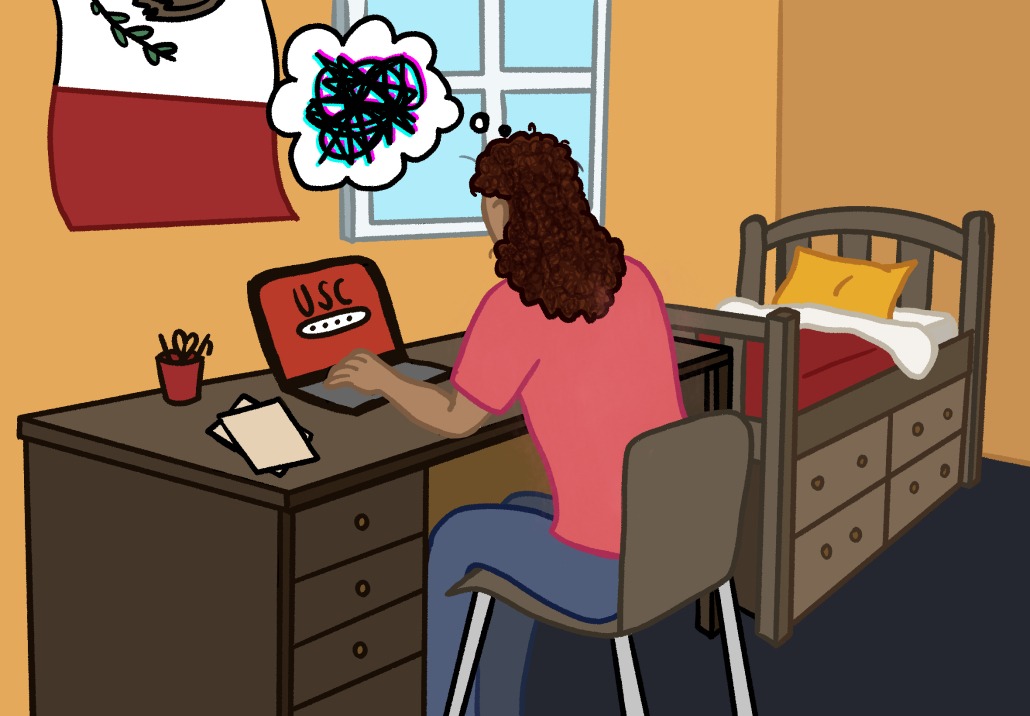UNDOCUTALES
USC must protect all undocumented Trojans
Undocumented students come from out of state, including places where resource centers have become illegal deserve proper DEI services.
Undocumented students come from out of state, including places where resource centers have become illegal deserve proper DEI services.


Progress in protecting undocumented immigrants has always been uncertain. While laws have evolved to support the community, they are frequently met with challenges from lawmakers who oppose programs designed to uplift them. Throughout the past years, federal judges have challenged programs such as Deferred Action for Childhood Arrivals, and more recently, the Biden administration’s program that granted legal status to spouses of United States citizens.
These are just two examples of opposition from federal judges involving immigrant benefits. As the presidential election approaches, immigrants are holding each other closely as candidates and their supporters praise plans for immigration policy. Just recently, attendees at the Republican National Convention held up signs reading “Mass Deportations now.”
Former President Donald Trump is once again the Republican nominee, and he has laid out his devastating mass deportation plans. Meanwhile, the Heritage Foundation — a prominent conservative think tank — has spent millions of dollars crafting a handbook for a second Trump presidency, known as Project 2025. These plans include strategies targeting the rights of undocumented children to access education.
While Trump has no direct ties with the foundation, Project 2025 was written by several former Trump administration officials, and it is important to understand the impact the proposed policies could have. Recently, the organization released a brief calling on states to require public schools to charge undocumented children tuition to enroll in public education. Such a move would draw a lawsuit challenging Plyler v. Doe, a landmark 1982 Supreme Court decision that affirmed that undocumented children are entitled to receive public education at no cost.
Trump has also made statements that he aims to amend the 14th Amendment to change the original meaning of natural-born citizenship, which has traditionally been interpreted as meaning that anyone born on United States soil is granted citizenship. The motivation behind his plan is based on his desire to remove this essential right from the children of undocumented immigrants.
Immigration has always been a big subject during election season, and challenges to immigration benefits have left many with worries about the future of immigration reform. However, reform does not just end at the federal level: Many states have failed their undocumented students. State governors such as Florida’s Ron DeSantis and Texas’ Greg Abbott have attacked college Diversity, Equity and Inclusion programs.
For example, Texas’ recent DEI ban prohibited programs for undocumented students at state colleges and universities. This ban came just months after the state debated whether it would sign into law a bill that would arrest people who police believe are undocumented. As the DEI ban went into effect on Jan. 1, many schools were forced to eliminate their DEI-related offices.
The termination of these programs makes it difficult for students to gain assistance regarding their immigration status, ultimately dismantling years of advocacy for undocumented students in Texas universities, as well as training for university administrators on how to assist their undocumented students.
As presidential candidates discuss their plans to dismantle immigration support for all, and state legislators attack programs improving access to DEI resources, USC must improve its efforts on behalf of undocumented students. While California and Los Angeles have demonstrated support for undocumented immigrants by establishing themselves as sanctuary places, not all students at USC come from California. Therefore, it is especially crucial to understand the different climates undocumented students come from and return to when the University fails to represent and advocate for them properly.
The University still has many improvements it must make to fully commit its support to undocumented students upon acceptance and attendance. Advocacy for change has been student-led — and yet USC still has not established a student center devoted to meeting the needs of undocumented students. When the University fails to support its undocumented students, it is demonstrating where it stands on actively making improvements for its students.
For out-of-state undocumented students who enter USC but return to states with anti-immigration laws, the lack of proper support from the University creates a sense of continued rejection. But it is the University’s responsibility to support all the students it accepts.
A true sense of belonging includes advocating for our undocumented Trojans, many of whom face the dangers of our broken immigration system once they return home. The University must establish proper representation and house resources that allow our undocumented students to view USC as their second home.
Heydy Vasquez is a junior writing about the lack of support for undocumented students on college campuses. Her column, “Undocu-Tales,” runs every other Thursday.
We are the only independent newspaper here at USC, run at every level by students. That means we aren’t tied down by any other interests but those of readers like you: the students, faculty, staff and South Central residents that together make up the USC community.
Independence is a double-edged sword: We have a unique lens into the University’s actions and policies, and can hold powerful figures accountable when others cannot. But that also means our budget is severely limited. We’re already spread thin as we compensate the writers, photographers, artists, designers and editors whose incredible work you see in our daily paper; as we work to revamp and expand our digital presence, we now have additional staff making podcasts, videos, webpages, our first ever magazine and social media content, who are at risk of being unable to receive the support they deserve.
We are therefore indebted to readers like you, who, by supporting us, help keep our paper daily (we are the only remaining college paper on the West Coast that prints every single weekday), independent, free and widely accessible.
Please consider supporting us. Even $1 goes a long way in supporting our work; if you are able, you can also support us with monthly, or even annual, donations. Thank you.
This site uses cookies. By continuing to browse the site, you are agreeing to our use of cookies.
Accept settingsDo Not AcceptWe may request cookies to be set on your device. We use cookies to let us know when you visit our websites, how you interact with us, to enrich your user experience, and to customize your relationship with our website.
Click on the different category headings to find out more. You can also change some of your preferences. Note that blocking some types of cookies may impact your experience on our websites and the services we are able to offer.
These cookies are strictly necessary to provide you with services available through our website and to use some of its features.
Because these cookies are strictly necessary to deliver the website, refusing them will have impact how our site functions. You always can block or delete cookies by changing your browser settings and force blocking all cookies on this website. But this will always prompt you to accept/refuse cookies when revisiting our site.
We fully respect if you want to refuse cookies but to avoid asking you again and again kindly allow us to store a cookie for that. You are free to opt out any time or opt in for other cookies to get a better experience. If you refuse cookies we will remove all set cookies in our domain.
We provide you with a list of stored cookies on your computer in our domain so you can check what we stored. Due to security reasons we are not able to show or modify cookies from other domains. You can check these in your browser security settings.
These cookies collect information that is used either in aggregate form to help us understand how our website is being used or how effective our marketing campaigns are, or to help us customize our website and application for you in order to enhance your experience.
If you do not want that we track your visit to our site you can disable tracking in your browser here:
We also use different external services like Google Webfonts, Google Maps, and external Video providers. Since these providers may collect personal data like your IP address we allow you to block them here. Please be aware that this might heavily reduce the functionality and appearance of our site. Changes will take effect once you reload the page.
Google Webfont Settings:
Google Map Settings:
Google reCaptcha Settings:
Vimeo and Youtube video embeds:
The following cookies are also needed - You can choose if you want to allow them:
